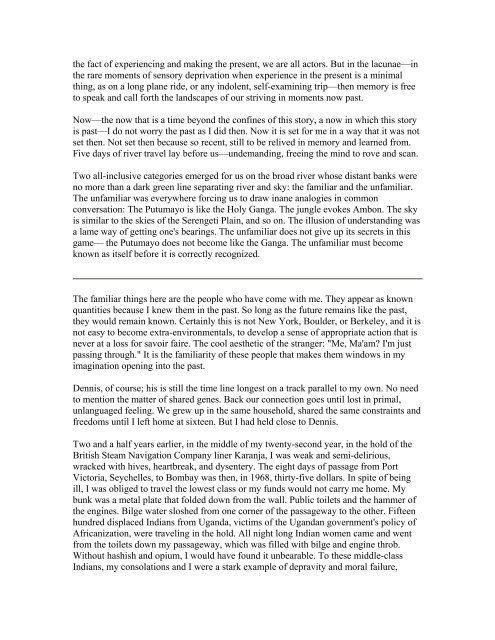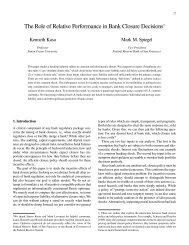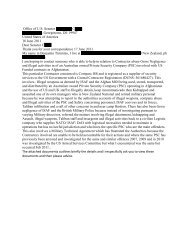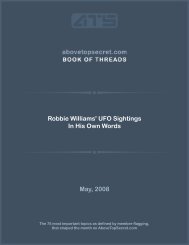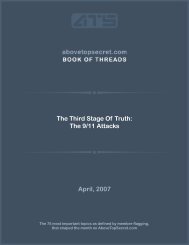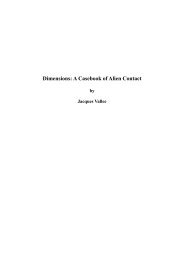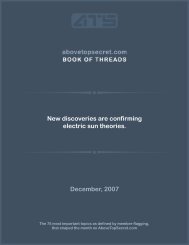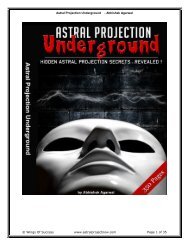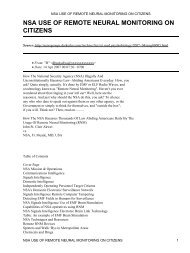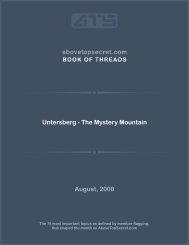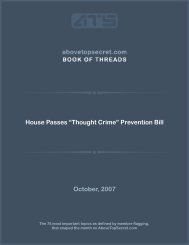We made our way under power, but slowly, to the middle of the shining brown riverbeneath an immense sky and an immense sun. A delicious moment—when one has doneall that one can for a journey and is at last in motion, no longer responsible, since thatburden has been given to pilot or engineer, boatman or ground control. The world one isleaving has been truly broken away from and the destination is still unknown. A favoritekind of moment, more familiar, yet less considered in the sterile environs of oceancrossingpassenger planes, and so how much richer here, surrounded by the cargo of sundriedfish and local bottled sodas toxic with brilliant dyes.I made a small space where I could sit cross-legged and rolled a joint out of theextraordinary kilo of Santa Marta Gold that we had laid in as a part of our provisionsduring the month in Bogota. The flow of the river was like the rich smoke I inhaled. Theflow of smoke, the flow of water, and of time. "All flows," said a beloved Greek.Heraclitus was called the crying philosopher, as if he spoke in desperation. But, whycrying? I love what he says—it does not make me cry. Rather than interpret pante rhea as"nothing lasts," I had always considered it a Western expression of the idea of Tao. Andhere we were, going with the Putumayo's flow. What a luxury to be smoking, again in thetropics, again in the light, away from the season and places of death. Away from livingunder Canada's State of Emergency, on the edge of war-bloated, mad America. Mother'sdeath and coincidentally the loss of all of my books and art, which had been collected,carefully shipped back and stored, and then had burned in one of the periodic brushfiresthat decimate the Berkeley hills. Cancer and Fire. Fire and Cancer. Away from theseterrible things, where Monopoly houses, waxy green, go tumbling into fissures in theanimated psychic landscape.And before all that, Tokyo: its outer-planet atmosphere, the pretension of fitting into thework cycle. How inhuman does one become in an inhuman situation for a little while?The nights on the trains. The airless rooms of the Akihabara English language schools.Tokyo demanded the spending of money, the saving of which was the only way out.I thought back over ten months of deepening alienation that had begun with leavingtropical Asia and, like a comet being drawn in to nearly brush its star, I was being drawnthrough Hong Kong, Taipei, Tokyo, and Vancouver before being hurled over war-toilingAmerica and on into the outer darkness of other, new, and wretchedly poor tropicalcountries. The flight from Vancouver to Mexico City passed over my mother sleeping inher grave for the first winter. On over Albuquerque, only a pattern of freewayinterchanges in the desert's night emptiness. On and on into what was then only an idea:the Amazon.Out on the river, the past could enter the stillness and exfoliate before the mind's eye,unfurling a dark fabric of interlocking casuistry. Forces, visible and hidden, stretchingback into one's past; migrations; religious conversions—our self discoveries make useach a microcosm of the larger pattern of history. The inertia of introspection leadstoward recollection, for only through memory is the past recaptured and understood. In
the fact of experiencing and making the present, we are all actors. But in the lacunae—inthe rare moments of sensory deprivation when experience in the present is a minimalthing, as on a long plane ride, or any indolent, self-examining trip—then memory is freeto speak and call forth the landscapes of our striving in moments now past.Now—the now that is a time beyond the confines of this story, a now in which this storyis past—I do not worry the past as I did then. Now it is set for me in a way that it was notset then. Not set then because so recent, still to be relived in memory and learned from.Five days of river travel lay before us—undemanding, freeing the mind to rove and scan.Two all-inclusive categories emerged for us on the broad river whose distant banks wereno more than a dark green line separating river and sky: the familiar and the unfamiliar.The unfamiliar was everywhere forcing us to draw inane analogies in commonconversation: The Putumayo is like the Holy Ganga. The jungle evokes Ambon. The skyis similar to the skies of the Serengeti Plain, and so on. The illusion of understanding wasa lame way of getting one's bearings. The unfamiliar does not give up its secrets in thisgame— the Putumayo does not become like the Ganga. The unfamiliar must becomeknown as itself before it is correctly recognized.The familiar things here are the people who have come with me. They appear as knownquantities because I knew them in the past. So long as the future remains like the past,they would remain known. Certainly this is not New York, Boulder, or Berkeley, and it isnot easy to become extra-environmentals, to develop a sense of appropriate action that isnever at a loss for savoir faire. The cool aesthetic of the stranger: "Me, Ma'am? I'm justpassing through." It is the familiarity of these people that makes them windows in myimagination opening into the past.Dennis, of course; his is still the time line longest on a track parallel to my own. No needto mention the matter of shared genes. Back our connection goes until lost in primal,unlanguaged feeling. We grew up in the same household, shared the same constraints andfreedoms until I left home at sixteen. But I had held close to Dennis.Two and a half years earlier, in the middle of my twenty-second year, in the hold of theBritish Steam Navigation Company liner Karanja, I was weak and semi-delirious,wracked with hives, heartbreak, and dysentery. The eight days of passage from PortVictoria, Seychelles, to Bombay was then, in 1968, thirty-five dollars. In spite of beingill, I was obliged to travel the lowest class or my funds would not carry me home. Mybunk was a metal plate that folded down from the wall. Public toilets and the hammer ofthe engines. Bilge water sloshed from one corner of the passageway to the other. Fifteenhundred displaced Indians from Uganda, victims of the Ugandan government's policy ofAfricanization, were traveling in the hold. All night long Indian women came and wentfrom the toilets down my passageway, which was filled with bilge and engine throb.Without hashish and opium, I would have found it unbearable. To these middle-classIndians, my consolations and I were a stark example of depravity and moral failure,
- Page 2: Being an Account of the Author's Ex
- Page 7 and 8: ALSO BY TERENCE MCKENNAThe Invisibl
- Page 9 and 10: In which Dennis begins to outline h
- Page 11 and 12: growth centers. I was discovered by
- Page 13 and 14: y the mushroom, but I did not want
- Page 15 and 16: similar to a "flying lesson": instr
- Page 17 and 18: whose medium is the convenient smok
- Page 19 and 20: could not imagine that the man I wa
- Page 21 and 22: CHAPTER TWOINTO THE DEVIL'S PARADIS
- Page 23: encounter Solo, and as I am a bit o
- Page 27 and 28: Vanessa and I sat together at the o
- Page 29 and 30: underway. Part of a flotilla of gas
- Page 31 and 32: The scene and the feeling were prof
- Page 33 and 34: without a seasoned expert in contro
- Page 35 and 36: We were grateful for the pause in t
- Page 38 and 39: The women announced that we would e
- Page 40 and 41: vegetable teacher one can gain entr
- Page 42 and 43: point during that evening, Dennis a
- Page 44 and 45: The oo-koo-he was a much more sensi
- Page 46 and 47: We transferred our equipment to the
- Page 48 and 49: That morning, after the departure o
- Page 50 and 51: Dennis was clearly quite disturbed
- Page 52 and 53: My interest in Tibetan painting and
- Page 54 and 55: controlling Datura is legendary. To
- Page 56 and 57: surface of my own mind reflected in
- Page 58 and 59: In which Dennis begins to outline h
- Page 60 and 61: ingesting the mushrooms, we lay wai
- Page 62 and 63: whatever it is, and just hope that
- Page 64 and 65: these sorts of discussions; now I l
- Page 66 and 67: Ayahuasca is frequently associated
- Page 68 and 69: The sense of the peculiar was nearl
- Page 70 and 71: cooled to absolute zero—the tempe
- Page 72 and 73: thought to me, that the body is lik
- Page 74 and 75:
molecule must have a ring free of m
- Page 76 and 77:
How could anyone conceive of such a
- Page 78 and 79:
thick rind sounded very like the be
- Page 80 and 81:
fire made of the gnarled and now su
- Page 82 and 83:
The result will be the work of work
- Page 84 and 85:
one needs. Particle accelerators, a
- Page 86 and 87:
MAO-inhibiting effect of these beta
- Page 88 and 89:
Dennis then sat up in his hammock.
- Page 90 and 91:
Immediately and without any effort
- Page 92 and 93:
sun was well up in the sky and it w
- Page 94 and 95:
quality. Tears welled up behind my
- Page 96 and 97:
on the bridge of a starship that wa
- Page 98 and 99:
space and aeon-consuming time, rush
- Page 100 and 101:
During this time, Dennis very slowl
- Page 102 and 103:
Valentine, a fifteenth-century alch
- Page 104 and 105:
They couldn't understand what was h
- Page 106 and 107:
couple working at a furnace; it alm
- Page 108 and 109:
LOOKING BACKWARDIn which several mi
- Page 110 and 111:
the "good shit" would appear. This
- Page 112 and 113:
We thought at the time that the pro
- Page 114 and 115:
We were gone scarcely forty minutes
- Page 116 and 117:
Dennis was only following Wyndham L
- Page 118 and 119:
electrons, but the whole atomic sys
- Page 120 and 121:
there was nothing to be done for it
- Page 122 and 123:
ecstasy, and there, in the darkness
- Page 124 and 125:
It was not a mirage of the conventi
- Page 126 and 127:
It is now seventeen days since Marc
- Page 128 and 129:
He seemed to soften slightly and le
- Page 130 and 131:
Ev and I lived quietly at La Chorre
- Page 132 and 133:
The timewave predicted its own end
- Page 134 and 135:
still time for them to grow into sh
- Page 136 and 137:
Amazon. It was a large coincidence,
- Page 138 and 139:
In February of 1970, a year before
- Page 140 and 141:
had received it in the traditional
- Page 142 and 143:
"My father was captured by the Russ
- Page 144 and 145:
ecause within a few minutes of sitt
- Page 146 and 147:
course there was another possibilit
- Page 148 and 149:
Ignoring my outstretched hand, he s
- Page 150 and 151:
time. And these kinds of time come
- Page 152 and 153:
If you had a perfect understanding
- Page 154 and 155:
occur on December 22, 2012. Strange
- Page 156 and 157:
Eternity," he made a statement ever
- Page 158 and 159:
greenhouse in the backyard. "I shou
- Page 160 and 161:
more so. It is far more likely that
- Page 162 and 163:
such a civilization has a faster-th
- Page 164 and 165:
THE HAWAIIAN CONNECTIONIn which pir
- Page 166 and 167:
Hours later, in the time of the fal
- Page 168 and 169:
that directly above her was a disk
- Page 170 and 171:
My colleagues, my friends and lover
- Page 172 and 173:
ward off the ordinary vicissitudes
- Page 174 and 175:
Guenther, Herbert V. Tibetan Buddhi
- Page 176 and 177:
Whitehead, A. N. Process and Realit
- Page 178 and 179:
12SI-DOI, a new psychotomimetic rad


